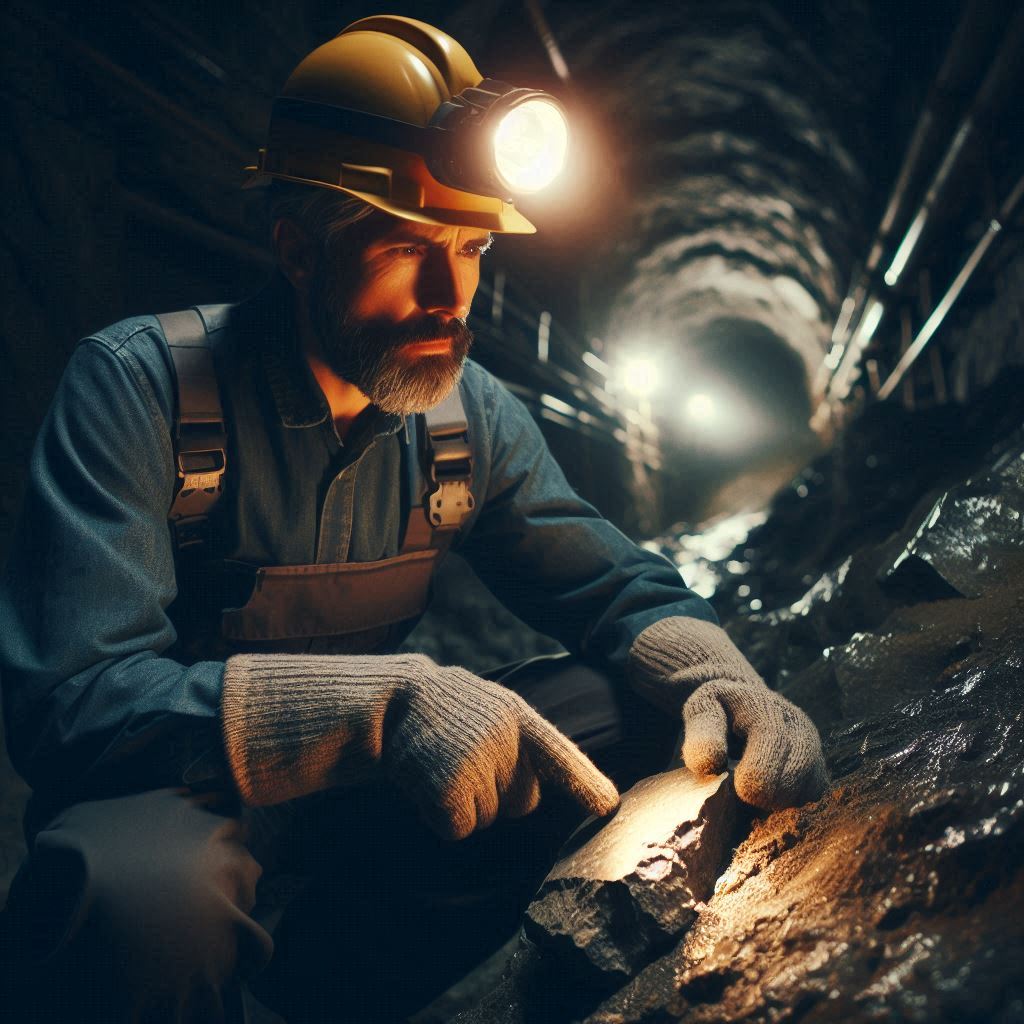Introduction
Mining engineering degrees are crucial for those aiming to excel in the mining industry.
This field focuses on extracting minerals from the Earth efficiently and safely.
Mining engineers design, operate, and manage mines, which requires specialized knowledge and skills.
Pursuing a degree in mining engineering from a reputable university sets the foundation for a successful career in this field.
A top university not only provides a robust curriculum but also offers state-of-the-art facilities and expert faculty.
The right education can significantly impact your career prospects and professional growth.
Importance of Choosing a Top University for This Field of Study
Selecting a top university for mining engineering is essential for several reasons.
Leading institutions offer advanced laboratories, cutting-edge technology, and hands-on training that are crucial for mastering mining techniques.
These universities often have strong industry connections, which can lead to valuable internships and job opportunities.
Moreover, top universities attract renowned faculty members who bring industry experience and research expertise.
Graduating from a prestigious university can enhance your resume and increase your chances of securing high-paying jobs in the mining sector.
Additionally, these institutions often have global networks and partnerships that can further expand your career horizons.
Leading Institutions for Mining Engineering Degrees
Several universities around the world are renowned for their mining engineering programs.
The Colorado School of Mines in the USA is famous for its cutting-edge research and extensive industry connections.
It offers a comprehensive mining engineering curriculum with a focus on both technical skills and industry practices.
Similarly, the University of Western Australia provides a top-ranked mining engineering program known for its strong research output and industry partnerships.
In Canada, the University of British Columbia stands out for its robust mining engineering department and its focus on sustainable mining practices.
Its programs are designed to address both current industry needs and future challenges.
Another notable institution is the University of Queensland in Australia, which offers a world-class mining engineering program with a strong emphasis on innovation and research.
The University of Pretoria in South Africa is also highly regarded for its mining engineering degree.
It combines practical training with theoretical knowledge, preparing students for diverse roles in the mining sector.
Lastly, the Imperial College London in the UK provides a highly respected mining engineering program, known for its rigorous academic standards and strong industry links.
Choosing the right university for a mining engineering degree can significantly impact your career.
Top universities offer advanced education, valuable industry connections, and robust research opportunities.
By selecting a leading institution, you position yourself for success in the competitive mining industry.
Investing time and effort into finding the best program will pay off with enhanced career prospects and professional development.
Importance of Accreditation
When selecting a university for a mining engineering degree, accreditation is crucial.
Accreditation ensures that the program meets industry standards for quality and rigor.
A degree from an accredited program is often required for professional certification and can significantly impact job prospects.
Employers prefer candidates from accredited programs as they are confident in the quality of education received.
Accreditation bodies assess and validate the curriculum, faculty qualifications, and facilities, ensuring that students are well-prepared for the industry.
Accreditation Bodies for Mining Engineering Degrees
Several key accreditation bodies oversee mining engineering programs.
In the United States, the Accreditation Board for Engineering and Technology (ABET) is the primary accrediting organization.
ABET‘s rigorous standards ensure that programs meet the essential criteria for engineering education.
Internationally, institutions such as the European Federation of National Engineering Associations (FEANI) also provide accreditation.
In Australia, Engineers Australia is a significant accrediting body.
Each of these organizations evaluates programs based on their educational quality and industry relevance.
How Accreditation Affects Job Prospects and Career Advancement
Accreditation plays a critical role in shaping job prospects and career advancement in mining engineering.
Graduates from accredited programs often have an advantage in the job market.
Employers trust that these graduates possess the necessary skills and knowledge.
Many licensing and certification boards require candidates to have degrees from accredited programs.
Accreditation also enhances the credibility of your resume, making you a more competitive candidate for advanced positions and promotions.
In short, choosing an accredited program can significantly impact your career trajectory and professional growth.
Read: Biomedical Engineering: Industry Outlook 2024
Top Universities in the United States
When it comes to pursuing a degree in mining engineering, the United States boasts some of the top universities in the world offering exceptional programs.
Below is a list of the top universities in the US that are known for their strong mining engineering programs:
Colorado School of Mines
- Located in Golden, Colorado, Colorado School of Mines is renowned for its mining engineering program.
- The university offers a comprehensive curriculum that covers all aspects of mining engineering.
- With a distinguished faculty consisting of industry experts, students benefit from hands-on learning experiences.
- Colorado School of Mines also provides numerous research opportunities for students to explore various facets of the mining industry.
- The university has strong industry partnerships, offering students valuable networking opportunities and real-world experience.
Penn State University
- Located in State College, Pennsylvania, Penn State University offers a well-regarded mining engineering program.
- The program at Penn State emphasizes a combination of theoretical knowledge and practical skills.
- With a diverse and accomplished faculty, students have access to mentorship and guidance from industry professionals.
- Research opportunities at Penn State are plentiful, allowing students to delve into specialized areas within mining engineering.
- The university has strong collaborations with industry partners, providing students with exposure to real-world challenges and solutions.
University of Arizona
- Based in Tucson, Arizona, the University of Arizona offers a top-notch mining engineering program.
- The program at the University of Arizona is known for its focus on sustainability and innovation in mining practices.
- Faculty members at the university are experts in their field, bringing a wealth of knowledge and experience to the classroom.
- Students at the University of Arizona have the opportunity to engage in cutting-edge research projects in collaboration with faculty.
- The university has strong ties to the mining industry, providing students with internships and job placement opportunities.
Overall, these universities in the United States are at the forefront of mining engineering education, offering students a well-rounded academic experience combined with practical industry exposure.
Graduates from these programs are well-equipped to make significant contributions to the mining industry and drive innovation in the field.
Read: Biomedical Engineering: Research and Development
Admission Requirements
General Admission Requirements
- Applicants must have a high school diploma or equivalent.
- Submission of standardized test scores such as the SAT or ACT.
- Letters of recommendation from teachers or professionals in the field.
- Personal statement or essay outlining interest in mining engineering.
- Official transcripts of academic records from previous institutions.
Specific Requirements for Top Universities
- GPA requirement of 3.0 or higher for top mining engineering programs.
- Strong background in math, physics, and chemistry courses.
- Demonstrated interest or experience in geology or earth sciences.
- Participation in extracurricular activities related to engineering or mining.
- Completion of prerequisite courses such as calculus and engineering basics.
Tips for Prospective Students
- Start preparing early by taking challenging courses in high school.
- Seek out internships or research opportunities in mining or engineering.
- Connect with professors or professionals in the field for guidance.
- Demonstrate leadership skills through involvement in clubs or organizations.
- Tailor your personal statement to highlight your passion for mining engineering.
Read: How Agricultural Engineers Improve Crop Yields

Curriculum and Specializations
The typical curriculum for a mining engineering degree
Mining engineering degrees offer a rigorous curriculum designed to prepare students for the challenges of the mining industry.
Typically, students begin with foundational courses in mathematics, physics, and chemistry.
They then advance to core subjects such as mineralogy, geology, and mining operations.
Advanced courses cover topics like mine design, ventilation, and rock mechanics.
Students also explore subjects related to safety, environmental concerns, and economic aspects of mining.
Practical labs and fieldwork are integral, allowing students to apply theoretical knowledge in real-world scenarios.
Specializations or concentrations offered by top universities
Top universities offer various specializations within mining engineering to cater to diverse interests and career paths.
For example, students might choose to focus on mineral processing, which deals with the extraction and refinement of valuable minerals.
Another common specialization is geological engineering, which combines geology with engineering principles to address geological challenges in mining.
Sustainable mining practices and environmental management are also popular concentrations, reflecting the industry’s growing emphasis on minimizing environmental impact.
Some programs even offer tracks in automation and robotics for modern mining operations.
Importance of hands-on experience and internships in the curriculum
Hands-on experience and internships are crucial components of a mining engineering curriculum.
They provide students with practical skills that cannot be fully developed through classroom learning alone.
Internships offer real-world exposure to mining operations, allowing students to work alongside industry professionals and gain insights into daily challenges and solutions.
Fieldwork and lab sessions are equally important, as they help students apply theoretical knowledge in practical settings.
This experience not only enhances learning but also boosts employability, as employers highly value practical experience when hiring new graduates.
Read: Exploring Subfields of Aerospace Engineering
Discover More: Customer Service Tips for Field Technicians
Industry Connections and Career Opportunities
The industry connections and partnerships of top universities
Top universities offering mining engineering degrees often have strong industry connections.
These partnerships provide students with valuable networking opportunities.
For example, the University of Arizona collaborates with leading mining companies for research and internships.
Similarly, the Colorado School of Mines works closely with industry leaders to enhance its curriculum.
These connections help students gain real-world experience and build professional relationships early in their careers.
Networking with industry professionals can significantly enhance a graduate’s job prospects in the competitive mining sector.
Career opportunities available to graduates of mining engineering programs
Graduates from top mining engineering programs have diverse career opportunities.
They can work in roles such as mining engineers, project managers, or consultants.
Many find positions with major mining companies, engineering firms, or government agencies.
Others may work in environmental protection or resource management.
The skills gained in these programs prepare students for a range of roles in mining operations, resource extraction, and sustainability projects.
The demand for skilled mining engineers continues to grow, driven by the need for advanced technologies and sustainable practices.
Information on average salaries and job outlook for mining engineers
The job outlook for mining engineers is positive.
According to the U.S. Bureau of Labor Statistics, employment in this field is expected to grow steadily.
Mining engineers earn competitive salaries, with the median annual wage for mining and geological engineers around $95,000.
Salaries can vary based on location, experience, and the type of employer.
Engineers working in remote locations or for major mining companies may earn higher wages.
The growth in demand for minerals and resources globally supports a favorable job market for mining engineering graduates.
Gain More Insights: Field Service Technician Career Advancement Tips
Transform Your Career Today
Unlock a personalized career strategy that drives real results. Get tailored advice and a roadmap designed just for you.
Start NowDelve into the Subject: Building a Strong Network Engineer Portfolio
Student Support and Resources
Student Support Services Available at Top Universities for Mining Engineering Students
Top universities offering mining engineering degrees provide extensive student support services.
These services are essential for navigating the complexities of the program.
Universities often have dedicated teams that assist students with academic and personal challenges.
They offer tutoring services, study groups, and workshops tailored to mining engineering topics.
Additionally, universities typically provide health and wellness services, including counseling and stress management programs.
These resources help students maintain a healthy work-life balance and ensure they are well-supported throughout their studies.
Resources: Career Counseling, Academic Advising, and Networking Opportunities
Career counseling is a crucial resource for mining engineering students.
Top universities offer specialized career services to help students explore job opportunities in the mining industry.
Career counselors provide guidance on resume writing, interview preparation, and job search strategies.
Academic advising is also an important service, offering personalized advice on course selection and academic planning.
Advisors help students map out their academic paths and address any issues that may arise.
Networking opportunities are another key resource.
Universities often organize industry events, job fairs, and networking sessions with mining professionals.
These events help students build connections and gain insights into potential career paths.
The Importance of Mentorship and Peer Support in a Rigorous Program Like Mining Engineering
Mentorship plays a significant role in mining engineering programs.
Experienced professionals and faculty members often serve as mentors.
They provide valuable advice, share industry insights, and offer support for academic and career-related concerns.
Peer support is equally important in such a rigorous program.
Collaborative study groups and peer networks allow students to share knowledge and resources.
This camaraderie helps students tackle challenging coursework and projects.
Both mentorship and peer support foster a sense of community and enhance the overall learning experience.
They provide a network of support that is crucial for success in a demanding field like mining engineering.
Find Out More: Petroleum Engineer: Travel and Lifestyle
Find Out More: Career Transition Tips for Environmental Engineers
Uncover the Details: Agricultural Engineering: A Career Overview
Conclusion
The Key Points Discussed in the Blog Post
Choosing the right university for a mining engineering degree is crucial for career success.
Top universities offer specialized programs that provide strong technical and practical foundations.
Schools such as Colorado School of Mines, University of Arizona, and University of Utah stand out in this field.
These institutions offer cutting-edge research facilities, experienced faculty, and strong industry connections.
Each program focuses on different aspects of mining engineering, including mineral extraction, environmental management, and safety protocols.
Research the curriculum, faculty expertise, and internship opportunities to find the best fit for your career goals.
Comparing these features helps you make an informed decision.
Prospective Students to Consider a Top University for Their Mining Engineering Degree
Prospective students should aim for top universities to gain a competitive edge in the mining engineering field.
Attending a prestigious institution provides access to advanced technology, resources, and networking opportunities.
These universities often have strong industry ties, leading to valuable internships and job placements.
They offer rigorous academic programs designed to prepare students for the challenges of the mining industry.
Engaging with leading professors and industry experts enhances learning experiences and career prospects.
A degree from a top university can open doors to higher-paying jobs and leadership positions in the industry.
Carefully evaluate each university’s offerings to find the best program that aligns with your aspirations.
The Importance of Thorough Research and Careful Consideration When Choosing a Program
Selecting the right program requires thorough research and careful consideration.
Evaluate the university‘s curriculum to ensure it covers all essential aspects of mining engineering.
Look into faculty qualifications and their research areas to gauge the program‘s strength.
Check for accreditation to ensure the program meets industry standards.
Consider the location and facilities, as well as available internships and job placement services.
Reviews and testimonials from current students and alumni can provide valuable insights.
Each aspect of the program should align with your career goals and personal preferences.
Taking the time to research and compare options will help you make a well-informed choice, ensuring you receive the best education for your future career.
[E-Books for Sale]
The Big Book of 500 High-Paying Jobs in America: Unlock Your Earning Potential
$19.99 • 500 High-Paying Jobs • 330 pages
Explore 500 high-paying jobs in America and learn how to boost your career, earn more, and achieve success!
See All 500 High-Paying Jobs of this E-Book
1001 Professions Without a Degree: High-Paying American Jobs You Can Start Now
$19.99 • 1001 Professions Without a Degree • 174 pages
Discover 1001 high-paying jobs without a degree! Unlock career tips, skills, and success strategies for just $19.99!




